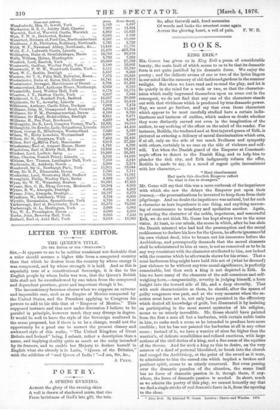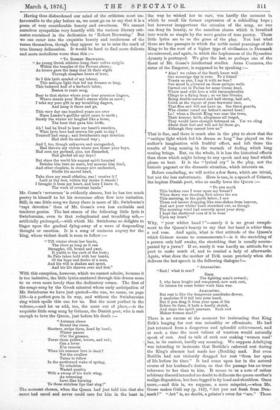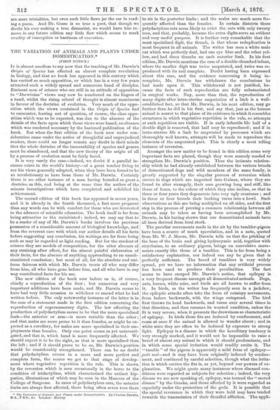BOOKS.
KING ERIK.*
MR. GOSSE has given us in King Erik a poem of considerable
beauty, the main fault of which seems to us to be that its dramatic form is not quite justified by its dramatic force. We enjoy the poetry ; and the delicate aroma of one or two of the lyrics lingers in our mind like the memory of old-fashionedgardens in the summer twilight. But when we have read and re-read the play, and let it lie quietly in the mind for a week or two, so that the character- istics which really impressed themselves upon us come out in the retrospect, we do not find that any one of the characters stands out with that vividness which is produced by true dramatic power. Nay, we must go further, and say that even those characters which appear to be most carefully studied have a certain indis- tinctness and haziness of outline, which makes us doubt whether they were distinctly carved out even in the imagination of the author, to say nothing of the effect on the mind of the reader. For instance, Botilda, the traduced and at first injured queen of Erik, is pictured as evincing a delicacy of moral discrimination which errs, if at all, only on the side of too much liveliness and sympathy with others, certainly in no case on the side of violence and self- will. Yet when the. Danish guard of the Emperor at Constanti- nople offers to desert to the Danish King, and to help him to plunder the rich city, and Erik indignantly refuses the offer, Botilda is made to say, in a mood of regret quite inconsistent with her character,- " Meet chastisement
Had made this churlish Emperor reflect On what is due to strangers."
Mr. Gosse will say that this was a mere outbreak of the impatience with which she saw the delays the Emperor put upon their journey, -the procrastinations he invented to keep them from their pilgrimage. And no doubt the impatience was natural, but for such a character as hers impatience is one thing, and anything savour- ing of countenance to treachery and spoliation another. Again, in painting the character of the noble, impetuous, and remorseful Erik, we do not think Mr. Gosse has kept always true to the same vision. At least, to our minds, the scene in which, after he has slain the Danish minstrel who had had the presumption and the moral recklessness to declare his love for the Queen, he affects ignorancelof his own violent deed, tries to brazen out his innocence before the Archbishop, and peremptorily demands that the sacred elements shall be administered to him at once, is not so conceived as to be in any way consistent with the character attributed to him, nor indeed
with the remorse which he afterwards shows for his crime. That a semi-barbarous king might have held this act of (what he deemed) just violence to be without anytrue moral significance, is perfectly conceivable, but then such a king is not depicted in Erik. In him we have many of the elements of the self-conscious and self-
weighing hero,-magnanimity, severity in judging himself, a keen insight into the inward side of life, and a deep sincerity. That with such characteristics as these, he should, after the spasm of guilty vengeance was past, and at the very moment when the re- action must have set in, not only have persisted in the effrontery which denied all knowledge of guilt, but illustrated it by insisting on participating in the most sacred mysteries of his religion, seems to us utterly incredible. Mr. Gosse should have painted from the first a man all but a barbarian, with certain noble traits in him, to make such a scene as he intended to produce here more credible ; but he has not painted the barbarian at all in any other scene ; instead of it, we have a warrior of aims far higher than the warrior's, of delicate sensibilities and refined emotions, with large notions of the civil duties of a king, and a fine sense of the equities of the throne. And for such a king as this to desire, on the very morrow of a deed of personal bloodshed, to break into the church
and compel the Archbishop, at the point of the sword as it were, to administer to him the sacred rite which implied a broken and penitent spirit, seems to us utterly unnatural. But even passing over the dramatic paradox of the situation, the scene itself has no force of dramatic passion in it, though there, if any- where, the force of dramatic passion is needed. In short, much as we admire the poetry of this play, we cannot honestly say that we find a single stroke of real dramatic force in it, from the opening
to the close.
• King Erik. By Edmund W. Goase. London : Chatto and Windua. 1876.
Having thus disburdened our mind of the criticism most un- favourable to the play before us, we must go on to say that it is a poem of very considerable beauty and sweetness. We cannot ourselves sympathise very heartily with the various literary esti- mates contained in the dedication to Robert Browning.' But we can enter into the exquisite beauty and tenderness of the verses themselves, though they appear to us to miss the mark of true literary delineation. It would be hard to find more delicate and more melodious verse than this :— " To ROBERT BROWNING.
"As young Greek athletes hung their votive strigils Within the temples of the Powers above ; As lovers gave the lamp that lit their vigils Through sleepless hours of love;
So I this lyric symbol of my labour,
This antique light that led my dreams so long,
This battered hull of a barbaric tabor, Beaton to runic song, Bear to that shrine where your dear presence lingers, Where stands your ➢fuse's statue white as snow ; I take my poor gift in my trembling fingers, And hang it there and go.
This very day one hundred years are over Since Landor's godlike spirit came to earth ; Surely the winter air laughed like a lover, The hour that gave him birth.
Ah ! had he lived to hear our heart's emotion, What lyric love had strewn his path to-day ! Yourself had song; and Swinburne's rapt devotion Had cleft its smiward way ; And I, too, though unknown and unregarded, Had thrown my violets where you threw your bays, Had seen my garland, also, not discarded, Had gloried all my days !
But since the world his august spirit haunted Detains him here no mere, but mourns him dead, And other chaplets, in strange airs enchanted, Girdle his sacred head, Take thou my small oblation, yea ! receive it Laid at thy feet, within thy shrine it stands ! I brought it from my heart, and here I leave it, The work of reverent hands."
Mr. Gosse's ' reverence ' is evidently sincere, but he has too much poetry in himself to let his reverence often flow into imitation. Still, in one little song we fancy there is more of Mr. Swinburne's 'rapt devotion' than of Mr. Gosse's own less excitable and tenderer genius. The last stanza of the following little lyric is Swinburnian, even to that reduplicated and trembling sob,— artificially prolonged,—with which Mr. Swinburne so delights to linger upon the gradual dying-away of a wave of desponding thought or emotion. It is a song of ominous augury for the king, whose violent death is soon to follow :-
" Till winter rivets her bands, The river as long as it can
Struggles, till, bound and pent, It yields to the curb of the frost ; So Fate takes hold with her hands, Of the hope and desire of a man, And his will is shaken and spent, And his life thrown over and lost."
With this exception, however, which we cannot admire, because it is too imitative, the little lyrics scattered through this drama seem to us even more lovely than the dedicatory verses. The first of the songs sung by the Greek minstrel whose early anticipation of Mr. Swinburne we have just quoted—the one, we mean, on page 138—is a perfect gem in its way, and without the Swinburnian ring which spoils this one for us. But the most perfect in the volume,—and let us add, too, the most out of place,—is the exquisite little song sung by Grimur, the Danish poet, who is rash enough to love the Queen, just before his death :—
" Autumn closes
Round the roses, Shatters, strips them, head by head; Winter passes O'er the grasses, Tarns them yellow, brown, and red ; Can a lover E'er recover When his summer love is dead ?
Yet the swallow Turns to follow
In the northward wake of spring,
To refashion Wasted passion With a sweep of his dark wing, As returning Love flies burning To these stricken lips that sing!"
The moment chosen, when the Queen had just told him that she never had cared and never could care for him in the least in the way he wished her to care, was hardly the moment in which to recall his former expression of a rekindling hope ; but however inopportune the occasion of the song, no one can deny its beauty, or the nameless charm which is breathed into words so simple by the mere genius of true poetry. These little lyrics are to us the gems of the play. Not but what there are fine passages in which the noble moral yearnings of the King to be the root of a higher type of civilisation in Denmark are mirrored, and again, in which the hopleasuess of the Byzantine dynasty is portrayed. We give the last, as perhaps one of the finest of Mr. Gosse's intellectual studies. Anna Comnena, the sister of the Emperor, is supposed to be speaking:-
"Alas!we rulers of the South know well
Our sovereign day is over. To a friend Trusty as you, I say it with no fear !
Our mood is pictured on these antique walls Carved out in Parian for some Caesar dead, Where mad with love a wild hermaphrodite Clings to a flying faun ; so we late Greeks, Being double-natured and half strong, half soft, Catch at the vigour of your brawnier race, That flies and will not have us. See these guards, Who cluster round my father's sacred head !
Lo! when a Danish King was near the town, Their honour, faith, allegiance all forgot, They would have straight betrayed us. Yet we cling About their feet and will not let them go,
Although they cannot love us."
That is fine, and there is much also in the play to show that the " antique light which led his dream so long " has played on the author's imagination with fruitful effect, and left there the results of long musing in the warmth of feeling which long musing brings. But, on the whole, it is less the historical effects than those which might belong to any epoch and any land which please us best. It is the " lyrical cry " in the play, not the historic pageant or the dramatic situation, which interests us.
Before concluding, we will notice a few flaws, which are trivial, but not the less unfortunate. Here is one, in a speech of Grimur, the hapless Danish poet, who so madly loves the Queen :-
" Do you mark
This broken rose I wear upon my breast?
When dawn was shooting first across the sea This morning, in the garth below, I saw These red leaves dropping like rose-flakes from heaven, And saw your whiter hand stretched out, as though The morning wind had scarcely spent your sleep.
I kept the shattered core of it to wear Upon my heart."
Why, " your whiter hand ? "—surely it is no great compli- ment to the Queen's beauty to say that her hand is whiter than a red rose. And again, what is that attitude of the Queen's which Grimur means to commemorate ?—is it the stretching of a person only half awake, the stretching that is usually accom- panied by a yawn? If so, surely it was hardly an attitude for a poet to make much of, and to remind a lady of afterwards. Again, what does the mother of Erik mean precisely when she delivers the last speech in the following dialogue?- " ADA LBJoRG.
"Rest! what is rest? Entx.
The lighting man's reward; I, who have fought and conquered, now seek rest, Or leisure for some better work than war.
ADILB,76 RC.
But rest is like the dangerous mandrake-flower, A medicine if it fall into your hand, But if you drag it from your span of life Before its time, it bath a deadly shriek, And slays the spirit unaware. Such rest Makes women mad !"
There is no excuse at the moment for insinuating that King Erik's longing for rest was unhealthy or effeminate. He had just returned from a dangerous and splendid achievement, and at such a time the most valiant of warriors would naturally speak of rest. And to talk of such rest making women mad' has, in its context, hardly any meaning. Wo suppose Adalbjorg was intending to insinuate that Botilda's enforced rest during the King's absence had made her (Botilda) mad. But even Botilda had not violently dragged her rest "from her span of life before its time." It had come upon her in the natural course of her husband's duties, so that the passage has no truer reference to her than to him. It seems to us a note of rather arbitrary discord intended no doubt to delineate the queen-mother's malign disposition, but here lugged in by head and shoulders. Once more,—and this is, we suppose, a mere misprint,—whes. Mr. Gosse makes Gisli say (p. 142), "Art you not fresh from Den- mark?" "Art" is, no doubt, a printer's error for "are." These
are mere trivialities, but even such little flaws jar the ear in read- ing a poem. And Mr. Gosse is so true a poet, that though we doubt his ever making a true dramatist, we would have him re- move in any future edition any little flaw which seems to mark crudity of conception or hastiness of execution.




































 Previous page
Previous page